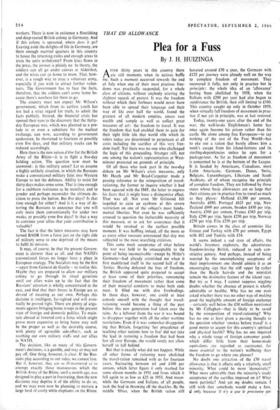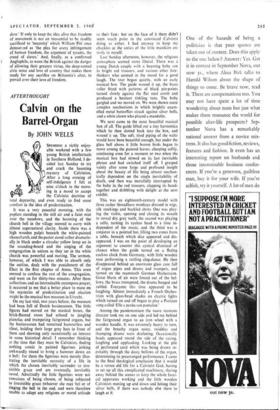Plea for a Fuss
THAT £50 ALLOWANCE
By J. H. HUIZINGA
AFTER thirty years in this country there are still moments when its natives baffle me. Such a moment occurred towards the end of July when one of their most precious free- doms was practically suspended, for a whole class of citizens, without anybody uttering the slightest squeak of protest. It was the freedom without which their forbears would never have been able to spread their language and their way of life over half the world, found the greatest of all modern empires, amass vast wealth and sample as well as collect great treasures of art : the freedom to travel. It was the freedom that had enabled them to gain for their tight little isle that world role which its rulers today are determined to perpetuate at all costs including the sacrifice of this very free- dom itself. Yet there was no one who challenged the logic of this proceeding. Stranger still, not one among the nation's representatives at West- minster protested on grounds of principle.
Of all those who took part in the two-day debate on Mr Wilson's crisis measures, only Mr Heath and Mr Boyd-Carpenter made a passing reference to the reimposition of travel- rationing, the former to inquire whether it had been squared with the IMF, the latter to express his fears that it might have a disincentive effect. That was all. Not even Mr Grimond felt impelled to raise an eyebrow at this severe restriction on one of the subject's most funda- mental liberties. Not even he was sufficiently aroused to question the ineluctable necessity of this measure, or to ask for assurances that it would be revoked at the earliest possible moment. It was baffling indeed, all the more so as every other measure announced that day was subjected to the most searching criticism.
This same meek acceptance of what before the war was held to be unacceptable to the point of being inconceivable—except by Hitler's Germany—had already astonished me when it first manifested itself in the second half of the 'forties. Having defeated the foes of freedom, the British appeared quite prepared to accept at least some of their priorities, renouncing their freedom of movement rather than some of their material comforts to make both ends meet. It filled me with dire forebodings. In those days, however, one could at least console oneself with the thought that travel- rationing would become a thing of the past before this new generation had taken over the reins. As a leftover from the war it was bound to disappear together with all the other wartime restrictions. Even if it was somewhat disappoint- ing that Britain, forgetting 'her precedence of teaching other nations how to live' did not take the lead in restoring a freedom that had been lost all over Europe, she would surely not allow herself to fall behind.
But that is exactly what did not happen. While all other forms of rationing were abolished the travel-ration remained with us for fourteen years, fluctuating between nil and £100 per annum, which latter figure it only reached for some eleven months in 1951 and from which it fell again to as low as £25 in 1953. And mean- while the Germans and Italians, of all people, took the lead in throwing off the shackles. By the middle 'fifties, when the British ration still hovered around £50 a year, the Germans with /125 per journey were already well on the way to complete freedom of movement. They recovered it fully, not only in practice but in principle: the whole idea of an 'allowance' having been abolished by 1958, when the Italians with £290 per year had also begun to outdistance the British, then still limited to £100. This country caught up only in October 1959, when virtually full freedom of movement in prac- tice if not yet in principle, was at last restored.
Today, twenty-one years after the end of the war, the well-to-do Englishman's home has once again become his prison rather than his castle. He alone among free Europeans—to say nothing of the rest of the Free World—has to eke out a ration that barely allows him a week's escape from his island-fortress and its sterling-dependencies unless he opts for a package-tour. As far as freedom of movement is concerned he is at the bottom of the League. It is headed by Americans, Canadians, most Latin Americans, Germans, Danes, Swiss, Belgians, Luxemburgers, Liberians and Saudi Arabians, all of whom recognise the principle of complete freedom. They are followed by those states whose basic allowances are so large that their citizens are in practice free to travel as much as they please: Holland £1,300 per annum, Australia £880, Portugal £625 per trip, New Zealand £600 per annum, Sweden £430 per trip, Austria £360 per annum, France 4365 per trip, Italy £290 per trip, Spain £250 per trip, Norway £250 per trip, Eire £250 per trip.
Britain comes in the class of countries like Greece and Turkey with £70 per annum, Egypt with £62 and Tunisia with £34.
It seems indeed a sad state of affairs, the world's foremost explorers, the adventurous freedom-loving British, reduced to such con- strictive penury. And perhaps, instead of being worried by the uncomplaining acceptance of . their imprisonment one should admire it as an encouraging sign that the stiff upper lip rather than the Beatle hair-do and the miniskirt remain the distinctive feature of the island race. But try as I may, I cannot suppress niggling doubts whether the absence of protest is wholly admirable or healthy. Why has no one even asked whether there was no other way of making good the negligible amount of foreign exchange —certainly well below the £50 million mentioned by Mr Callaghan—that is likely to be saved by the reimposition of travel-rationing? Why has no one at least given a passing thought to the question whether 'smokes before travel' is a good motto to accept for this country's spiritual and physical health? Why has no one inquired why a whole range of foreign consumer goods which differ little from their home-made equivalents are regarded as sacrosanct, far more essential to the nation's wellbeing than the freedom to go where one pleases? • No doubt one attraction of the £50 travel allowance is that it affects only a relatively small minority. What could be more 'democratic?' What more admirable than the minority's ready acceptance of the sacrifice imposed on it? What more patriotic? And yet my doubts remain. I still wish that somebody would make a fuss, if only because 'II n'y a que le provisoire qui dure.' If only to keep the idea alive that freedom of movement is not an inessential to be readily sacrificed to 'necessity' which William Pitt once denounzed as 'the plea for every infringement of human freedom, the argument of tyrants, the creed of slaves.' And, finally, as a confirmed Anglophile, to warn the British against the danger of allowing their greatest virtue, the deep-rooted civic sense and love of country that makes them ready for any sacrifice on Britannia's altar, to prevail over their love of freedom.































 Previous page
Previous page